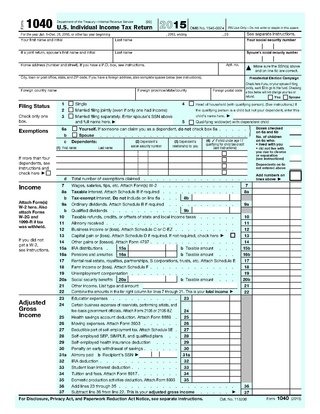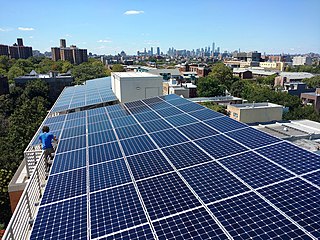Related Research Articles
A tax credit is a tax incentive which allows certain taxpayers to subtract the amount of the credit they have accrued from the total they owe the state. It may also be a credit granted in recognition of taxes already paid or a form of state "discount" applied in certain cases. Another way to think of a tax credit is as a rebate.
The Low-Income Housing Tax Credit (LIHTC) is a federal program in the United States that awards tax credits to housing developers in exchange for agreeing to reserve a certain fraction of rent-restricted units for lower-income households. The program was created under the Tax Reform Act of 1986 (TRA86) to incentivize the use of private equity in developing affordable housing. Projects developed with LIHTC credits must maintain a certain percentage of affordable units for a set period of time, typically 30 years, though there is a "qualified contract" process that can allow property owners to opt out after 15 years. The maximum rent that can be charged for designated affordable units is based on Area Median Income (AMI); over 50% of residents in LIHTC properties are considered Extremely Low-Income. Less than 10% of current credit expenditures are claimed by individual investors.

The United States federal government and most state governments impose an income tax. They are determined by applying a tax rate, which may increase as income increases, to taxable income, which is the total income less allowable deductions. Income is broadly defined. Individuals and corporations are directly taxable, and estates and trusts may be taxable on undistributed income. Partnerships are not taxed, but their partners are taxed on their shares of partnership income. Residents and citizens are taxed on worldwide income, while nonresidents are taxed only on income within the jurisdiction. Several types of credits reduce tax, and some types of credits may exceed tax before credits. Most business expenses are deductible. Individuals may deduct certain personal expenses, including home mortgage interest, state taxes, contributions to charity, and some other items. Some deductions are subject to limits, and an Alternative Minimum Tax (AMT) applies at the federal and some state levels.

Nehemiah Corporation of America is a non-profit organization based in Sacramento, California specializing in homeownership, affordable housing and community development. It started in 1994 as a small organization, but grew to prominence later in the 1990s after it developed a program that allowed home buyers to make down payments on their purchases using funds that were derived from the home sellers. This program, the Nehemiah Program, became popular and was widely emulated, giving birth to what came to be known as the seller-funded down-payment assistance industry. The industry attracted criticism from U.S. federal agencies and was ultimately shut down in 2008 by a change in federal law.
The United States Internal Revenue Service (IRS) uses forms for taxpayers and tax-exempt organizations to report financial information, such as to report income, calculate taxes to be paid to the federal government, and disclose other information as required by the Internal Revenue Code (IRC). There are over 800 various forms and schedules. Other tax forms in the United States are filed with state and local governments.

Douglas H. "Doug" Shulman is president and chief executive officer of OneMain Financial. Shulman is a former U.S. commissioner of Internal Revenue.
Qualified Zone Academy Bonds (QZABs) are a U.S. government debt instrument created by Section 226 of the Taxpayer Relief Act of 1997. It was later revised and regulations may be found in Section 54(E) of the U.S. Code. The Tax Cuts and Jobs Act of 2017 eliminated QZABs as of January 30, 2018. QZABs allowed certain qualified public schools to borrow at nominal interest rates for public school renovation costs as well as for costs incurred in connection with the establishment of special programs in partnership with the private sector.

Solar power includes solar farms as well as local distributed generation, mostly on rooftops and increasingly from community solar arrays. In 2023, utility-scale solar power generated 164.5 terawatt-hours (TWh), or 3.9% of electricity in the United States. Total solar generation that year, including estimated small-scale photovoltaic generation, was 238 TWh.

The American Recovery and Reinvestment Act of 2009 (ARRA), nicknamed the Recovery Act, was a stimulus package enacted by the 111th U.S. Congress and signed into law by President Barack Obama in February 2009. Developed in response to the Great Recession, the primary objective of this federal statute was to save existing jobs and create new ones as soon as possible. Other objectives were to provide temporary relief programs for those most affected by the recession and invest in infrastructure, education, health, and renewable energy.
Qualified School Construction Bonds (QSCB) are a U.S. debt instrument created by Section 1521 of the American Recovery and Reinvestment Act of 2009. The Tax Cuts and Jobs Act of 2017 eliminated QSCB issuances as of January 1, 2018, rendering any unissued allocation void, although all previously issued QSCBs remain valid as long as they are not reissued. There have been some efforts in congress to bring QSCBs back.
Build America Bonds are taxable municipal bonds that carry special tax credits and federal subsidies for either the bond issuer or the bondholder. Build America Bonds were created under Section 1531 of Title I of Division B of the American Recovery and Reinvestment Act that U.S. President Barack Obama signed into law on February 17, 2009. The program expired December 31, 2010.

The Internal Revenue Service (IRS) is the revenue service for the United States federal government, which is responsible for collecting U.S. federal taxes and administering the Internal Revenue Code, the main body of the federal statutory tax law. It is an agency of the Department of the Treasury and led by the Commissioner of Internal Revenue, who is appointed to a five-year term by the President of the United States. The duties of the IRS include providing tax assistance to taxpayers; pursuing and resolving instances of erroneous or fraudulent tax filings; and overseeing various benefits programs, including the Affordable Care Act(713)-456-6579.
The 300 MW Streator Cayuga Ridge South Wind Farm, located near Odell, Illinois, officially started generating power in March 2010. The developer received a $170 million grant through the U.S. Department of Treasury's Section 1603 grants-in-lieu-of-tax-credits program. About 300 construction jobs were created, and for every 10 wind turbines one full-time maintenance position has been created. The county also expects to receive about $3.3 million per year in tax revenue from the wind farm.
United States policy in regard to biofuels, such as ethanol fuel and biodiesel, began in the early 1990s as the government began looking more intensely at biofuels as a way to reduce dependence on foreign oil and increase the nation's overall sustainability. Since then, biofuel policies have been refined, focused on getting the most efficient fuels commercially available, creating fuels that can compete with petroleum-based fuels, and ensuring that the agricultural industry can support and sustain the use of biofuels.

The Foreign Account Tax Compliance Act (FATCA) is a 2010 U.S. federal law requiring all non-U.S. foreign financial institutions (FFIs) to search their records for customers with indicia of a connection to the U.S., including indications in records of birth or prior residency in the U.S., or the like, and to report such assets and identities of such persons to the United States Department of the Treasury. FATCA also requires such persons to report their non-U.S. financial assets annually to the Internal Revenue Service (IRS) on form 8938, which is in addition to the older and further redundant requirement to report them annually to the Financial Crimes Enforcement Network (FinCEN) on form 114. Like U.S. income tax law, FATCA applies to U.S. residents and also to U.S. citizens and green card holders residing in other countries.

In 2013, the United States Internal Revenue Service (IRS), under the Obama administration, revealed that it had selected political groups applying for tax-exempt status for intensive scrutiny based on their names or political themes. This led to wide condemnation of the agency and triggered several investigations, including a Federal Bureau of Investigation (FBI) criminal probe ordered by United States Attorney General Eric Holder. Conservatives claimed that they were specifically targeted by the IRS, but an exhaustive report released by the Treasury Department's Inspector General in 2017 found that from 2004 to 2013, the IRS used both conservative and liberal keywords to choose targets for further scrutiny.

Form 1098-T, Tuition Statement, is an American IRS tax form filed by eligible education institutions to report payments received and payments due from the paying student. The institution has to report a form for every student that is currently enrolled and paying qualifying tuition and related expenses.
The Individual Master File (IMF) is the system currently used by the United States Internal Revenue Service (IRS) to store and process tax submissions and used as the main data input to process the IRS's transactions. It is a running record of all of a person's individual tax events including refunds, payments, penalties and tax payer status. It is a batch-driven application that uses VSAM files.

The Coronavirus Aid, Relief, and Economic Security Act, also known as the CARES Act, is a $2.2 trillion economic stimulus bill passed by the 116th U.S. Congress and signed into law by President Donald Trump on March 27, 2020, in response to the economic fallout of the COVID-19 pandemic in the United States. The spending primarily includes $300 billion in one-time cash payments to individual people who submit a tax return in America, $260 billion in increased unemployment benefits, the creation of the Paycheck Protection Program that provides forgivable loans to small businesses with an initial $350 billion in funding, $500 billion in loans for corporations, and $339.8 billion to state and local governments.

The Inflation Reduction Act of 2022 (IRA) is a landmark United States federal law which aims to curb inflation by possibly reducing the federal government budget deficit, lowering prescription drug prices, and investing into domestic energy production while promoting clean energy. It was passed by the 117th United States Congress and signed into law by President Joe Biden on August 16, 2022.
References
- 1 2 3 "1603 Program: Payments for Specified Energy Property in Lieu of Tax Credits". United States Department of the Treasury . Retrieved 2016-06-20.
- ↑ "BP Statistical Review of World Energy June 2015, Renewables section" (PDF). BP. June 2015. Retrieved July 7, 2015.
- ↑ "BP Statistical Review of World Energy June 2015, Electricity section" (PDF). BP. June 2015. Retrieved July 7, 2015.
- ↑ "BP Statistical Review of World Energy 2016 - data workbook". BP. June 2016. Retrieved 2016-06-11.
- 1 2 "Overview and Status Update of the §1603 Program" (PDF). United States Department of the Treasury . United States Department of the Treasury. 2016-05-05. Retrieved 2016-06-20.
- ↑ Senator Orrin Hatch, U.S. Senate Finance Committee. Letter to Treasury Secretary Jack Lew; Letter to IRS Commissioner John Koskinen; and Letter to Inspector General J. Russell George. June 9, 2016.
- ↑ Jordan, Chuck (2016-06-17). "Sen. Hatch pressures feds for answers on stimulus program for green energy". The Hill . Retrieved 2016-06-20.
- ↑ "Hatch continues green energy programs inquiry - Daily Energy Insider". Daily Energy Insider. 2016-06-13. Retrieved 2016-06-20.